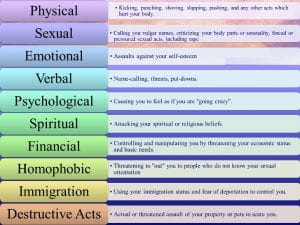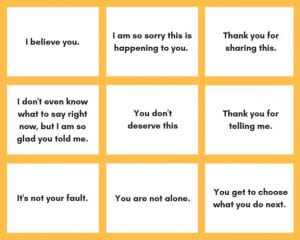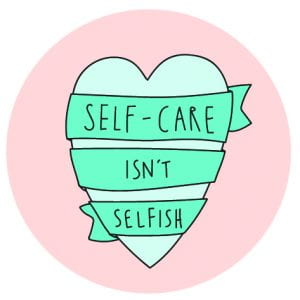To honor Sexual Assault Awareness Month (SAAM) in April, HPW had a live roundtable around supporting survivors of abusive relationships, whether it’s sexual abuse, emotional abuse, physical abuse, or financial abuse. This blog covers all of the important details of that conversation. Sadly, a lot of survivors right now may not be able to escape their abusive situations. Many people currently can’t leave their houses or go to a friend’s place to escape due to the current pandemic we are living through. Financial situations are also exacerbated right now and may make it even tougher for some to leave an abusive relationship. In our roundtable the other week, we talked about how to be an ally to those in this tricky situation. Watch here, or read on!
What exactly does abuse look like?
Stereotypically, when we think of an abusive relationship, we think of physical abuse. But abuse can be of a physical nature, and emotional one, a sexual one, or a financial one. Abuse does not need to be put into a box, and it’s important to keep this in mind when supporting survivors. Really, at the end of the day, abuse occurs when the power and control in a relationship is shifted to be completely one sided.
So, in what ways might we go about supporting someone who is experiencing abuse?
Remaining available to someone in an abusive relationship is one of the most helpful things you can do. There are three great ways to do this: 1) Ask a question, 2) Listen up, and 3) Stay connected. Let’s look at each of these closer.
Ask a question: Asking a question as simple as “Hey, how is it going?” and then really listening to what the person has to say can make worlds of a difference.
Listen up: When you listen, you must listen without having your own agenda. You are listening to hear what this person’s perspective on their situation is. Active listening techniques can be used here to support your loved one. Examples of some things you may say after listening are:
- “I don’t even know what to say right now, but I’m so glad you told me.”
- “I’m so sorry that this is happening to you, and I am here to support you.”
- “I believe you” – saying this and truly meaning it is crucial in supporting a survivor – it is not our place to play detective in these situations; most survivors tell the truth about their abuse, and it can be quite harmful to not believe somebody who has put their trust in you in this situation.
Stay connected: Staying connected can be crucial in supporting a survivor because when a survivor is isolated from outside support, the abuser tends to have more power over them. Your loved one may not be reaching out simply because they can’t, not because they don’t want or need support. Every once in a while, try being the first one to reach out – this can act as a lifeline to your loved one. Avoid ultimatums; although it might be easy to say something along the lines of, “If you don’t leave this person by [said time] I cannot continue to be friends with you,” this is simply not what your loved one needs to hear right now. Abuse does not follow any specific timeline, and there are many reasons why someone may not be able to leave an abusive relationship right away, not to mention it could be quite dangerous to leave an abusive relationship at certain times (more on this below). Tough love is not what people need in these circumstances.
Supporting a Survivor Dos and Don’ts
Don’t: Tell someone to leave – the leaving part of an abusive relationship is the most dangerous phase of the relationship: the point when someone leaves and six weeks after this is the time that this person is most likely to be killed.
Do: Work with your loved one to create a safety plan with tangible steps for this person to use when the time comes that they are able to leave.
Don’t: When it comes to sexual abuse, do not ask your loved one victim-blaming questions. Your initial response in certain cases might be to ask questions such as, “How did this happen – didn’t you cover your drink? What were you wearing when this happened?” But these questions simply contribute to a culture of victim blaming that takes the blame off of the perpetrator and puts it onto the survivor instead.
Do: Reinforce that you believe and support your loved one.
Don’t: Make it about you and your own personal desires as they relate to the situation. Supporting someone who is experiencing abuse consists of allowing the survivor to still have their autonomy. They are otherwise already losing autonomy in their relationship, so when we come in and tell them what to do – i.e. “You should file a police report” – it takes the autonomy away from the survivor. Let them make these decisions on their own time, and support them while they move through it.
Do: Seek help for yourself if you need it personally, but leave your opinions out of your loved one’s decisions.
What should you do if you think that your loved one is in a situation that could potentially be very dangerous?
If you hear that something that makes you concerned your loved one is in immediate danger (they are isolated, being monitored or stalked, or the person has a weapon), you – or both of you together – can call the National Domestic Violence Hotline to come up with a plan to stay as safe as possible.
Note: It is very important to understand that some societal structures and resources may be safe for certain populations to use, but not for others. (i.e., a person of color may not be comfortable making a call to the police as police are notorious for not supporting the black community equally in comparison to their white counterparts). Don’t assume that calling the police is a given in these situations – it is best to understand the ways in which your loved one might be affected by these societal structures first, and then make a sound decision on next steps.
How to Talk to Someone Who is Causing Harm
Abuse, coercion, and control are incredibly common… people that cause harm might be the same people we love and care about. If we are going to address the harm that is being caused, we must learn how to talk to those causing the harm as well. When talking to someone who is causing harm in a relationship, you can use the same tactics as you might when talking to a survivor – 1) Ask a question, 2) Listen up, and 3) Stay connected. Think about how you would like to be treated if you were causing harm, and approach this person the same way. ‘Call the person in’ versus ‘calling them out.’ People don’t listen when they are called out – by inviting the person causing harm to have an open and constructive conversation about their behavior, you might have a better chance of getting through to them. It is important to recognize that change will only be made if both sides are engaged in the conversation. Currently, our justice system focuses more on punishing than restorative justice, but restorative justice can prove to be largely important in enacting change rather than simply perpetuating the norm.
How can I take care of myself when supporting a survivor?
You are actually considered a ‘secondary survivor’ when you are supporting a survivor as this process can be quite emotionally taxing for you as well. So, make sure to take care of yourself through it all, and try to recognize your limits:
- Practice grounding techniques – breathing exercises can serve as a great way to ground yourself. Box breathing is one good technique to try – there are many others as well.
- Don’t get so completely invested that you forget about other pieces of your own life/your health, recovery, and healing. You have a responsibility to yourself as first and foremost – we can’t help others if we aren’t doing well ourselves.
- Keeping healthy boundaries in all relationships is crucial, especially when it comes to supporting a survivor. What are your boundaries and what can you give? What is your personal threshold? Keep these questions in mind as you are helping your loved one, and never feel guilty for taking a step back to preserve your own mental health.
If you’ve made it this far, thanks for sticking with us! We hope that you learned something new and are feeling more prepared to help. Remember, take care of yourself, take care of each other, take care DePaul! <3
xoxo,
HPW




